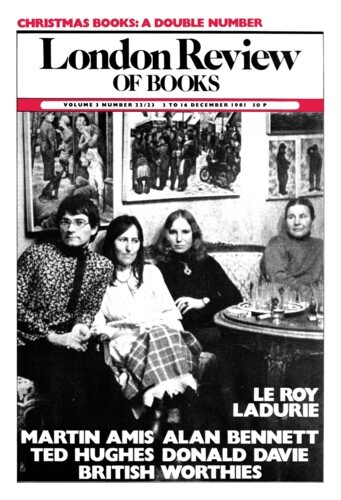A.J. Ayer
A.J. Ayer, who died in 1989, was the author of Language, Truth and Logic, published in 1936 when he was 25, and The Problem of Knowledge, among other books. After the war he became Grote Professor of the Philosophy of Mind and Logic at UCL and between 1959 and 1978 was Wykeham Professor of Logic at Oxford.
Cavortings
23 May 1985
The Oxford Vote
7 March 1985
Aux sports, citoyens
3 December 1981
Pieces about A.J. Ayer in the LRB
Old Scores
Colin McGinn, 30 August 1990
When I was a quivering graduate student at Oxford in 1973, fresh from the Northern provinces, I sat for the John Locke Prize, a voluntary two-day examination for Oxford postgraduates in...
V.G. Kiernan on the high price of poison
V.G. Kiernan, 23 June 1988
Slavery has been ubiquitous in history, with innumerable forms and functions: something of the truth of human nature is revealed by this fact. Horace saw nothing wrong in it, though himself the...
Minimalism
David Pears, 19 February 1987
Philosophy’s critics have a variety of criteria from which to choose. The first question to ask about any philosopher’s claims is whether they are true. But there are other questions...
A Billion Years a Week
John Ziman, 19 September 1985
A computer is a tool, working the intentions of its designer or user. It is no more malevolent than the village clock whose chimes wake us in the night, or the car whose failed brakes run us...
An End to Anxiety
Barry Stroud, 18 July 1985
Wittgenstein predicted that his work would not be properly understood and appreciated. He said it was written in a different spirit from that of the main stream of European and American...
The philosopher contemplates his burnt wings
David Pears, 18 October 1984
The seventh volume of Russell’s Collected Papers contains the core of a book which he never completed. He stopped working on it, probably because he felt that he could not honestly go on....
Gains in Clarity
P.F. Strawson, 4 November 1982
‘Philosophy in the 20th century’ or ‘Analytical philosophy in the 20th century’? Ayer is well aware that the two descriptions are not co-extensive. He marks his...
Short Books on Great Men
John Dunn, 22 May 1980
To be truly a Master is to have authority. To claim to be a Master is to claim to possess authority. We can be confident that more persons claim to have authority than do truly have it. What is...
Read anywhere with the London Review of Books app, available now from the App Store for Apple devices, Google Play for Android devices and Amazon for your Kindle Fire.
Sign up to our newsletter
For highlights from the latest issue, our archive and the blog, as well as news, events and exclusive promotions.




